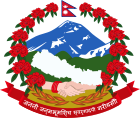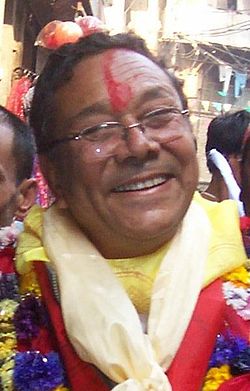- Dhyan Govinda Ranjit
-
Nepal 
This article is part of the series:
Politics and government of
NepalGovernment Political history · Constitution Executive President
Ram Baran YadavVice President
Parmanand JhaPrime Minister
Baburam BhattaraiCouncil of Ministers (List) Parliament Constituent Assembly Chairman
Subash Chandra NemwangVice Chairman
Purna Kumari SubediJudiciary Supreme Court Chief Justice
Khil Raj RegmiElections Election Commission
Constituent Assembly: 2008
Presidential: 2008Political parties Administrative divisions Capital
Regions
Zones
Districts
VDCs
Dhyan Govinda Ranjit a.k.a. Dhyan Govinda Ranjitkar (Nepali/Nepal Bhasa: ध्यान गोबिन्द रञ्जित) is a Nepalese politician, member of Nepalese constituent assembly/Nepalese Parliament and a leader of Nepali Congress. Ranjit was elected to the Nepalese Constituent Assembly from Kathmandu constituency. He is an elected member of Nepali Congress parliamentary party working committee (Nepali: संसदीय दलको कार्यसमिति) and a representative of Nepali Congress in work editing committee (Nepali:कार्य व्यवस्था परामर्श समिति) .[1] He is also the Immediate Past President of Kathmandu District Committee of Nepali Congress
Ranjit has been active in Nepalese politics since the "civil disobidience movement" (bhadra awagya andolan) in 1954 (2014 Bikram Sambat). He was amongst the first group of politicians imprisoned in the coup d'état of 1960 (2017 Bikram Sambat) by King Mahendra for advocating democracy and supporting elected Prime Minister, Bishweshwar Prasad Koirala. During King Mahendra's direct rule after coup d'etat of 1960 (1 Poush 2017), he was accused of Sedition (Nepali:राजद्रोह) for trying to establish democratic political system against King's direct autocratic system due to which he was imprisoned for around a decade in various prisons in Nepal and spent many years in exile along with leaders like Bishweshwar Prasad Koirala, Girija Prasad Koirala, Ganesh Man Singh and Krishna Prasad Bhattarai.
Contents
Early life
Ranjit was born in Majipat,Kathmandu to Narayan Govinda Ranjit and Mohan Devi Ranjit. He obtained school level education from J.P. High School. He was arrested at a young age of 17 by Panchayati regime of Nepal for supporting democracy. In spite of being in and out of prison for most of his life for advocating freedom and democracy in Nepal, he obtained Master of Arts (Political Science) and studied Master of Public Administration and Bachelor of Law.
Struggle for democracy
Ranjit was active to restore democracy in Nepal during entire 30-year period of autocratic rule by Nepalese Monarchy called as Panchayati Regime. He was one of the founders of Nepal Student Union (Nepali:Nepal Bidhyarthi Sangh) and served in various capacity as leader of Nepal Student Union (Nepali:Nepal Bidhyarthi Sangh) and then banned Nepali Congress.
He was one of the main leaders involved in restoration of democracy during king's direct rule in Nepal.
Imprisonment and exile
Ranjit was imprisoned by the partyless Panchayati Government of Nepal for more than ten years for advocating freedom and multi party democracy in Nepal. During the partyless Panchayati Regime (1960–1990), he spent many years in exile in India along with Supreme Leader of Nepali Congress Ganesh Man Singh.
After restoration of democracy, he ran for election for Member of Parliament in 1994 (2051 Bikram Sambat) from Kathmandu Constituency No. 7 on behalf of Nepali Congress. [2]
Role in Nepalese Constituent Assembly/Nepalese Parliament
Ranjit is an elected member of the Nepali Congress parliamentary party working committee.[3] He is a representative of Nepali Congress in work editing committee (Nepali: कार्य व्यवस्था परामर्श समिति) of Nepalese Constituent Assembly/Nepalese Parliament, an important committee coordinating all activities of Nepalese Constituent Assembly/Nepalese Parliament. Ranjit represents Nepali Congress in National Interest Preservation Committee, which is a thematic committee of Nepalese Constituent Assembly.[4]
Social service
Ranjit is advisor to numerous social organizations in Nepal. In the past, he has been elected to the executive committee of Nepal Council of World Affairs.
Recent news
He was the coordinator of Nepali Congress Mahasamiti preparation committee [5] which successfully carried out preparations for Nepali Congress Mahasamiti meeting held from November 1 to November 3, 2009 in Kathmandu, Nepal. The party has 1,250 representatives in the Mahasamiti, the second powerful body in the party.[6]
He was the chief guest in an interaction programme jointly organized by the Russian Center for Science and Culture and the Nepal Council of World Affairs in February 2009. The interaction programme was titled ‘foreign policy of Russia in the present context’ and marked the 200th anniversary of the diplomatic day of Russia.[7]
On 29 December 2008, he presented a letter of appreciation to Park Young Seok, a Korean mountaineer who has climbed all of the world's 14 mountains above 8,000 metres. The fecilitation programme was organized by Nepal Korea Cooperation Council.[8]
He was the chief guest in the programme organized on 16 June 2008 at the Russian Centre of Science and Culture to mark the 45th Anniversary of the Cosmos Flight by the world’s first woman cosmonaut Valentina Terehkova (i.e. on June 16, 1963).[9]
In April 2008 he won the Kathmandu-9 seat in the Constituent Assembly election, under the first-past-the-post (FPTP) system.[10]
He was the Coordinator of the Martyrs Day Main Organising Committee 2063 (2007) to mark Martyrs Day in Nepal.[11]
In the past, he served as the head of seven party alliance delegates overseeing the activities of the city.
See also
- Nepali Congress
- Bishweshwar Prasad Koirala
- Ganesh Man Singh
- Krishna Prasad Bhattarai
- Girija Prasad Koirala
- Sher Bahadur Deuba
References
Categories:- Members of the Nepalese Constituent Assembly
- Nepali Congress politicians
- Nepalese exiles
- Living people
Wikimedia Foundation. 2010.

